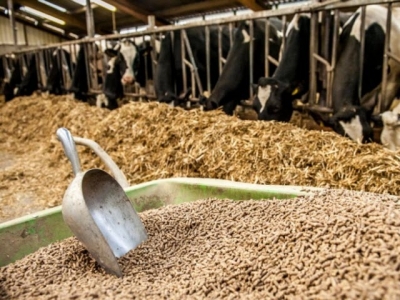Should producers hike zinc levels in high producing dairy cows?

'Producers need to keep zinc to copper ratios in mind, but they also need to look at their absolute zinc and copper supplementation levels to optimize productivity and return on investment.' © istock/Arie Mastenbroek
There are productivity and economic impacts from formulating with quality trace mineral sources at the appropriate levels, says Zinpro.
Research continues in dairy and other farmed animal species to further define these levels, said the organic trace mineral supplier.
We spoke to Terry Ward, global director, research & nutritional services, Zinpro, to hear more.
“Recent information suggests absolute copper supplementation levels may be too high in many areas for dairy cattle (>15 ppm Cu), and there may be a need for an increased supplementation level of zinc (>40 ppm), especially in high-producing dairy cows,” he said.
However, a decrease in copper supplementation in concert with an increase in zinc supplementation will increase the zinc to copper ratio, he cautioned.
Historically, zinc to copper ratios were thought to be optimized in ruminants in the range of 3:1 to 5:1.
“Obviously, either zinc or copper supplementation levels can influence that ratio. More research is ongoing; however, current work and field application shows extending the ratio beyond 5:1 is not detrimental and conversely may be beneficial.
“Producers need to keep zinc to copper ratios in mind, but they also need to look at their absolute zinc and copper supplementation levels to optimize productivity and return on investment,” he said.
Confounding factors
It should also be noted, he said, that absolute trace mineral supplementation levels, especially in association with productivity levels, have been shown to be different relative to historic information.
“There are many confounding factors, including trace mineral source(s), trace mineral availability, interactions with feedstuffs, and health status and productivity of the animals in question,” he continued.
A study from 2014 showed supplementing dairy cows with 40-ppm zinc from zinc-amino acid complex (Availa-Zn) improved productivity (Nayeri et al). “More recent research confirms that the source of trace minerals is critical (Batistel et al., 2016)," he added.
Peer reviewed research
Ward was speaking to FeedNavigator as Zinpro hailed a milestone in terms of its scientific study output – its 200th peer reviewed research publication. “Peer reviewed work has been the cornerstone of our company since its foundation,” he said.
Collaborating with universities not only lends credibility, but such research allows multiple replications and trials involving a wide cohort of animals, he continued.
The 200th peer reviewed study was published in the Journal of Animal Science. The researchers included experts from Zinpro, Oregon State University and others. The team said they evaluated the impact of beef-cow diet supplementation with a combination of trace minerals - zinc, manganese, copper and cobalt - during the third trimester of gestation.
The supplier has been increasingly focused on generational nutrition – the idea that offspring benefit from maternal trace mineral nutrition long after birth.
In the study in question 84 pregnant Angus × Hereford cows were allocated to 21 drylot pens at the end of their second trimester of gestation.
The pens were assigned to receive forage-based diets containing 1) sulfate sources of Cu, Co, Mn, and Zn (INR); 2) an organic complexed source of Cu, Mn, Co, and Zn (AAC; Availa 4 from Zinpro) or 3) no supplemental Cu, Co, Mn, and Zn (CON).
Diets were offered from the start of the trial until calving and formulated to meet requirements for energy, protein, macrominerals, Se, I and vitamins, said the authors.
Calf performance
The study, said Zinpro, showed that by supplementing the gestating cow with 7 g per day of trace minerals, in an organic complexed source form, during the last trimester, producers could improve overall calf growth and health while also realizing improvements in calf performance through to finishing.
“Results from this experiment are novel and suggest that supplementing late-gestating beef cows with an organic complexed source of Co, Cu, Zn, and Mn instead of no supplementation may be an alternative to optimize offspring productivity in beef production systems.
“The physiological mechanism underlying these effects, including the role of each specific trace mineral supplemented herein on fetal development and programming, still requires investigation,” concluded the researchers.
Antibiotic reduction
Ward said that trial showed the lasting impact of organic trace minerals during gestation on calves in the form of improved immunity and greater weaning weight and carcass weight.
“One key factor drawn out by the study is that veterinary treatment costs are reduced by having healthier calves. The research team found that, in the growing lot, calves from the AAC cows had reduced incidence of bovine respiratory disease compared with CON and INR cohorts,” he added.
One of Zinpro's key goals is finding a way to support industry as it looks to reduce its reliance on antibiotics: "Having healthier animals at the outset will help," he said.
Có thể bạn quan tâm
 Feeding cows milk that may contain antibiotic residues - what's the risk?
Feeding cows milk that may contain antibiotic residues - what's the risk? EFSA says the feeding to calves of colostrum and milk containing residues of antimicrobials that could select for antimicrobial-resistant bacteria
 Dairy calf diets: what is the impact of nutrition on gene expression
Dairy calf diets: what is the impact of nutrition on gene expression Dairy calf diets: what is the impact of nutrition on gene expression, what type of fatty acids should be used?
 Can crude glycerin, soybean oil improve the nutritional quality of beef?
Can crude glycerin, soybean oil improve the nutritional quality of beef? Adding crude glycerin, soybean oil to cattle diets may impede saturated fatty acid generation and improve the nutritional quality of meat products, say research